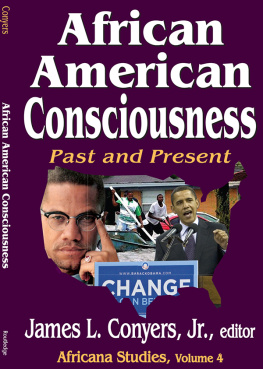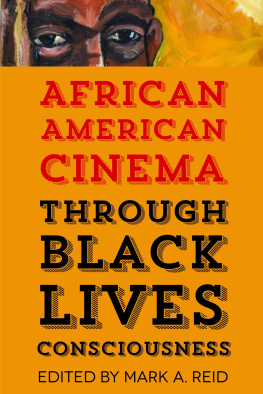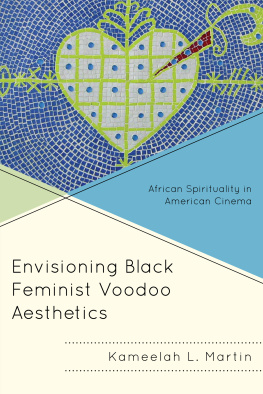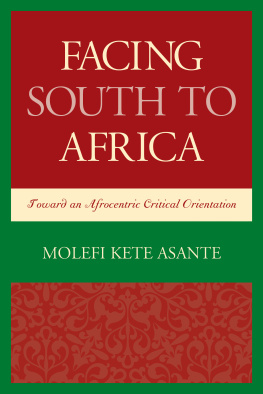First published 2012 by Transaction Publishers
Published 2017 by Routledge
2 Park Square, Milton Park, Abingdon, Oxon OX14 4RN
711 Third Avenue, New York, NY 10017, USA
Routledge is an imprint of the Taylor & Francis Group, an informa business
Copyright 2012 by Taylor & Francis.
All rights reserved. No part of this book may be reprinted or reproduced or utilised in any form or by any electronic, mechanical, or other means, now known or hereafter invented, including photocopying and recording, or in any information storage or retrieval system, without permission in writing from the publishers.
Notice:
Product or corporate names may be trademarks or registered trademarks, and are used only for identification and explanation without intent to infringe.
Library of Congress Catalog Number: 2011017764
Library of Congress Cataloging-in-Publication Data
African American consciousness : past and present / James L. Conyers, Jr.,
editor.
p. cm. (Africana studies ; v. 4)
Includes index.
ISBN 978-1-4128-4307-2 (alk. paper)
1. African AmericansRace identity. 2. African Americans Political activity. 3. African AmericansSocial conditions. 4. African AmericansStudy and teaching. I. Conyers, James L.
E185.625.A368 2011
973.0496073dc23
2011017764
ISBN 13: 978-1-4128-4307-2 (pbk)
Contents
Introduction
James L. Conyers, Jr.
1. Black Consciousness, Pan-Africanism, and the African World History Project: The Case of Africana Studies for African Cultural Development
Greg E. Carr
2. A Genealogical Review of the Worldview Concept and Framework in Africana Studies-Related Theory and Research
Karanja Keita Carroll
3. Teaching Black Males: Cooperative Learning and the Problem of Implementation
Serie McDougal, III
4. Cowboys of Color: The Perceived Sociocultural Significance of U2 Rodeo
Demetrius W. Pearson
5. Heirs to Despair-ity: New Orleans, African Americans, and the Inconvenient Historical and Present-Day Truths Laid Bare by Hurricane Katrina
Pamela D. Reed
6. Malcolm Xs Leadership and Legacy: From the Grassroots to African Diaspora
Andrew P. Smallwood
7. Reflections on African Celestial Culture
Denise Martin
8. Black History dot Com: The Black Atlantic, the Barack Obama Campaign for Change, and Implications for Change and Stability in a Networked World
Reynaldo S. Anderson
9. Raising Her Voice: Writings By, For and About Women in Muhammad Speaks Newspaper, 19611975
Bayyinah S. Jeff ries
James L. Conyers Jr.
The fourth edition of the serial Africana Studies: A Review of Social Science Research , concentrates thematic emphasis on Africana consciousness, past and present. Simply put, the essays aggregated in this volume, reflect ideas probing schema of culture, race, and class, within the interdisciplinary matrix of Africana Studies. Axiomatic, in advancing the idea of meta-theory and triangulation, interpretation of data, becomes the funnel, conundrum, memory, and remnant of cultural surroundings. In an historical perspective, John Henrik Clarke writes:
Unfortunately, African people in the United States still have some prevailing misconceptions about their education and education in general. We were not brought to the United States or to the so called new world to be educated. We were brought as a massive labor supplyAfricans in the United States were trained to serve.
Additionally, Haki Madhubuti, provides discourse, concerning this subject acknowledging:
One of the tragedies of Black life in America is that too many Black people never acquire insight into their own existence. They just do not know who they are. And, this confusion about identity and source is at core of our ignorance. The Afrikans have a saying: If you dont know who you are, any history will doAfrikan American people have little knowledge of themselves. We are products of a slave history, a Eurocentric world-view, that by definition cannot be developmental or inspirational.
Still the idea of Africana consciousness is described by Wade Nobles, in the following manner:
In defining the term consciousness for African people, the immediate task is to free African thinking from the meanings and constraints imposed by training in Western thought and techniques, and especially by the Western episteme and paradigms inherited and used for thinking itself. The African heritage of black people is replete with elegant, elaborate, and extraordinary conceptualizations of human knowing and awareness. The following explication is a brief and partial composite of African-centered understanding of consciousness.
Contingent with the idea of addressing consciousness in place, space, and timeone speculates about memory. Reflexive of the past, accountability is referential when attempting to post alternative query for strategies of advancement. Intelligibly phrased, Charles P. Henry talks about ideology, politics, and culture, remarking:
Any attempt to communicatewhether written, oral, or visualis fraught with danger. Attempts at communication between racial groups are especially dangerous. Yet individuals and groups must communicate to survive. During the civil rights movement one often heard the question: What does the Negro want? After a decade of demonstrations, protests, and marches, the question was no longer asked. Instead one heard: The Negro has got too much! Too many blacks, however, such questions and reactions were absurd. No one could speak for all blacks. Moreover, few blacks believed that they had too much of anything that really mattered.
Communication and interpretative analysis are critical variables, in locating a deep structural analysis of Africana culture and consciousness. Notwithstanding, what is the interpretation of sources, to address, when and where does the researcher acknowledge their limitations and when to recuse oneself from the process of discovery and interrogation of the subject matter. Newness, of this discussion lends ideas to the ontological aspects of the transmittal of examining Africana phenomena.
Even more important is how methodology places emphasis on interpretation and the necessity of interdisciplinary research and writing in a global society. Yet, world view, culture, analytic thinking, and historiography can be used as tools of analysis, in the process of discovery, pedagogy, and survey research of Africana yore and portray. Still, advancing the idea of Africana Studies, mixed methodology and triangulation provide rubrics and alternative assessments of examining phenomena, with regard to place, space, and time.
Yet, the discussion of consciousness needs to be defined, in order, to have context, meaning, and relevance. Consciousness then takes on a variation of meanings; however, within the use of this volume, contextuality lends itself to refer to the lack there of, oneself in the past, present, and future. As such, subordination then can be classified in a systemic manner of classifying colonialism, annexation, voluntary, and involuntary migratory status. Either selection renders sectionalism, which then precipitates to domination, colonialism, imperialism, annexation, assimilation, and fusion. In summary, Molefi Kete Asante cites this concept in the following:









